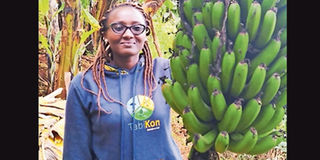The girl who fell in love with bananas

Tabitha Gichiru in their farm in Gatundu North, where she grows bananas which she processes making gluten-free flour. The nutrition graduate is the proprietor of Tabikon Solutions, which processes the bananas. PHOTO | BRIAN OKINDA | NMG
What you need to know:
- At Kalro, she got in-depth insight into the entire banana value chain, from the crop’s suckers development in the laboratories to its harvesting upon maturity.
- The agricultural training centre offered her more, including facilities from where she could put the processing knowledge into practice, as she worked on establishing her own processing plant.
- She adds that the flour can be used in baking, as an alternative to wheat flour, and can also be used for cooking porridge, and making healthy baby foods.
- In April, during the African Women for Biosciences (AWfB) forum, she was among those acknowledged as creating an impression in agri-biosciences.
Ngorongo is a rustic settlement in Gatundu North, Kiambu County, where farming is the region’s mainstay.
Tabitha Gichiru, 25, hails from the village, and comes from a farming heritage. His grandfather and parents were farming macadamia and coffee, which they milled.
But years later, upon her graduation from the University of Nairobi in 2013 with a degree in nutrition, biochemistry option, Tabitha has chosen a different path.
On her parent’s five acres, she grows bananas on two acres and adds value to the produce.
“I planted the tissue-culture variety that I acquired from Kenya Agricultural and Livestock Research Organisation Horticultural Research Institute, in Thika, where I did done my attachment, and as the crop grew, I reflected on how well to market the produce for profit,” offers Tabitha, who runs the business under the name Tabikon Solutions that she formed in 2016.
At Kalro, she got in-depth insight into the entire banana value chain, from the crop’s suckers development in the laboratories to its harvesting upon maturity.
“I began growing the bananas in late 2016 and initially sold them in the local markets and also in Thika Town, both ripe and green,” says Tabitha, who invested into 200 seedlings that she bought at Sh110 each.
The idea of adding value made her enrol at the agribusiness incubation facility, Agriculture Technology Development Centre (ATDC) in Ruiru last November.
The agricultural training centre offered her more, including facilities from where she could put the processing knowledge into practice, as she worked on establishing her own processing plant.
Though nearly exiting the institution, she is currently working with her two siblings and two employees in the processing enterprise, making gluten-free banana flour.
“The two employees work on the farm, tending the bananas and harvesting them when mature, while the rest help with the processing,” she says, adding that drying bananas takes up to four days depending on the intensity of the sun and the prevailing weather conditions.
The needed moisture content should be 10—12 per cent, to prevent growth of moulds in the flour and aflatoxin infestation.
CREATING AN IMPRESSION
To produce the flour, she first cleans the bananas using sufficient water and a detergent specially formulated for that purpose.
“I then cut the bananas into smaller pieces without peeling. The peels contain vital nutrients that should not be discarded. I then dry the before grinding into flour.”
The flour is gluten-free, therefore, it comes handy in making flour that can safely be consumed by people who have gluten intolerance.
“The flour controls sugar levels in the body and hence good for diabetics. It is also rich in potassium, several vitamins and magnesium, making the flour a healthy diet component.”
She adds that the flour can be used in baking, as an alternative to wheat flour, and can also be used for cooking porridge, and making healthy baby foods.
“I sell the produce through WhatsApp and Facebook at Sh350 a kilo,” says Tabitha, who now 350 stems of the Cavendish, Fhia 17, Grande Naine, and Williams varieties.
According to her, the entire process requires high-levels of hygiene, hence the bananas should be thoroughly washed.
“Those working in processing should also have protective and hygienic gear for the job, especially gloves, facial masks and head gear.”
In April, during the African Women for Biosciences (AWfB) forum, she was among those acknowledged as creating an impression in agri-biosciences.
Dr Catherine Kunyanga, a food scientist at the University of Nairobi, points out that processing must comply with all food safety regulations so that nutrients in the products are not damaged in the process.
“Acquisition of the Kenya Bureau of Standards (Kebs) certification, which is a key requirement in the country’s processing sector and largely depends on satisfying the prerequisites of good manufacturing practices must be done.”
****
Get it fast
Forgotten but nutritious foods
Many people do not know the health and nutritional benefits of banana flour and other foods deemed ‘forgotten’.
This is one of the factors that played a key role in driving Tabitha Gichiru towards the crop’s processing sector, according to the biochemistry enthusiast.
She is also working on processing amaranth, sweet potatoes, pumpkin and ripe banana flour.
Dr Willis Owino, a senior lecturer at the Department of Food Science and Technology at the Jomo Kenyatta University of Agriculture and Technology, notes that cutting post-harvest losses plays a vital role in ensuring food security.
East African is among the world’s foremost consumers of bananas with an annual consumption rate of 300-400kg per person.




